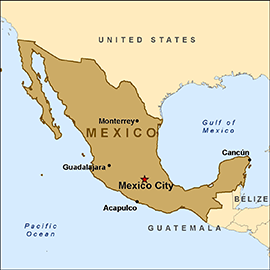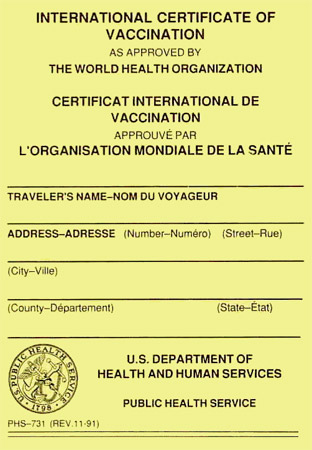Health and Medical: Immunizations
From the US Centers for Disease Control
Latest advice:
| Vaccines for disease | Recommendations | Clinical Guidance for Healthcare providers |
|---|---|---|
| Routine vaccines |
Make sure you are up-to-date on all routine vaccines before every trip. Some of these vaccines include
|
Immunization schedules |
| COVID-19 | All eligible travelers should be up to date with their COVID-19 vaccines. Please see Your COVID-19 Vaccination for more information. |
COVID-19 vaccine |
| Chikungunya | There has been evidence of chikungunya virus transmission in Mexico within the last 5 years. Chikungunya vaccination may be considered for the following travelers:
|
Chikungunya - CDC Yellow Book |
| Hepatitis A | Recommended for unvaccinated travelers one year old or older going to Mexico. Infants 6 to 11 months old should also be vaccinated against Hepatitis A. The dose does not count toward the routine 2-dose series. Travelers allergic to a vaccine component should receive a single dose of immune globulin, which provides effective protection for up to 2 months depending on dosage given. Unvaccinated travelers who are over 40 years old, are immunocompromised, or have chronic medical conditions planning to depart to a risk area in less than 2 weeks should get the initial dose of vaccine and at the same appointment receive immune globulin. |
Hepatitis A - CDC Yellow Book Dosing info - Hep A |
| Hepatitis B | Recommended for unvaccinated travelers younger than 60 years old traveling to Mexico. Unvaccinated travelers 60 years and older may get vaccinated before traveling to Mexico. |
Hepatitis B - CDC Yellow Book Dosing info - Hep B |
| Malaria | CDC recommends that travelers going to certain areas of Mexico take prescription medicine to prevent malaria. Depending on the medicine you take, you will need to start taking this medicine multiple days before your trip, as well as during and after your trip. Talk to your doctor about which malaria medication you should take. Find country-specific information about malaria. |
Malaria - CDC Yellow Book Considerations when choosing a drug for malaria prophylaxis (CDC Yellow Book) Malaria information for Mexico. |
| Measles | Cases of measles are on the rise worldwide. Travelers are at risk of measles if they have not been fully vaccinated at least two weeks prior to departure, or have not had measles in the past, and travel internationally to areas where measles is spreading. All international travelers should be fully vaccinated against measles with the measles-mumps-rubella (MMR) vaccine, including an early dose for infants 6–11 months, according to CDC’s measles vaccination recommendations for international travel. |
Measles (Rubeola) - CDC Yellow Book |
| Rabies | Dogs infected with rabies are sometimes found in Mexico. Rabies is also commonly found in some terrestrial wildlife species. If rabies exposures occur while in Mexico, rabies vaccines are typically available throughout most of the country. Rabies pre-exposure vaccination considerations include whether travelers 1) will be performing occupational or recreational activities that increase risk for exposure to potentially rabid animals and 2) might have difficulty getting prompt access to safe post-exposure prophylaxis. Please consult with a healthcare provider to determine whether you should receive pre-exposure vaccination before travel. For more information, see country rabies status assessments. |
Rabies - CDC Yellow Book |
| Typhoid | Recommended for most travelers, especially those staying with friends or relatives or visiting smaller cities or rural areas. |
Typhoid - CDC Yellow Book Dosing info - Typhoid |
The above information has been excerpted from the US "Centers for Disease Control and Prevention" website and was last updated by World Trade Press on Friday, 1st November, 2024. Addtional information is available at https://cdc.gov
Copyright © 1993—2024 World Trade Press. All rights reserved.

 Mexico
Mexico 
